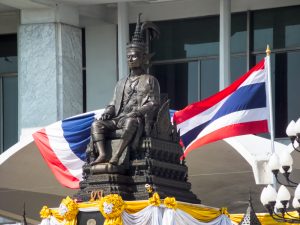Thailand’s parliament yesterday rejected a bid by the opposition to strip the country’s senate of the powers to elect the country’s next prime minister, the latest sign of intensifying political wrangling as the country moves toward elections due early next year.
The proposal sought the removal of a provision that gives the Senate the power to select the prime minister together with the lower house for the first five years following post-coup elections in 2019.
Under the constitution drafted by Thailand’s military junta in 2017, the 250 members of the Senate are appointed from the Royal Thai Armed Forces and are explicitly barred to members of political parties. Together with the 500 elected members of the lower house, these 250 appointees will vote to select the country’s next prime minister following elections in 2023, significantly diluting the power of the directly elected parliament.
During the joint vote of parliament, the proposal received 356 votes in support, Bloomberg reported, falling just short of the 364 needed. Success was in many ways a logical and political impossibility, given that it effectively required more than a third of senators to vote in favor of reducing their own power. According to Bloomberg, this is the fifth failed attempt that Thailand’s opposition has made to erase the Senate’s voting power from the constitution.
Indeed, this was precisely the function that the military intended the 2017 Constitution to serve: as a means of preventing the people from making a “wrong” decision, specifically, from re-electing the proxies of Thaksin Shinawatra, the exiled former prime minister and bête noire of the conservative military-royalist establishment. The military launched a coup to remove Thaksin from power in 2006, and again to depose his sister Yingluck Shinawatra in the 2014 coup led by Prayut. In between, it used various legal ploys and a campaign of street protests to remove Thaksinite governments from power.
The Constitution was what enabled the military-backed candidate Prayut Chan-o-cha to emerge victorious at national elections in March 2019, after serving for five years at the head of a military government. With the backing of the 250 senators, Prayut effectively enjoyed a 33 percent head start on any rival candidates, and only required the support of 126 of the 500 members of the lower house to win the election as prime minister. Under the constitution, the same will be true of the election that is scheduled to be held by March 2023.
While the effort failed, it is just one tactic that the opposition has employed to showcase both the undemocratic nature of Thailand’s current political system and the specific role that the Senate plays in limiting the outcomes that the country’s political system can produce. Indeed, the drafting of a new constitution has been a central demand of both the opposition and the large street demonstrations that took place in Bangkok and other Thai cities in late 2020 and early 2021.
Ahead of yesterday’s parliamentary vote, lawmakers from the Pheu Thai Party, which represents the Thaksinite section of Thai politics, called for the establishment of a panel to draft a new constitution, saying that the removal of the senate’s voting powers doesn’t go far enough. Interestingly, they were joined by members of the Democrat Party, which is part of the ruling coalition.
Late last month, Thailand’s Constitutional Court suspended Prayut from power until it rules on an opposition petition arguing that he has reached the end of the constitution’s eight-year term limit. The petition argued that the nearly five years that Prayut spent as head of the military government should count towards the eight years. The opposition has also called four no-confidence votes in Prayut, most recently in July, accusing him of mismanaging the economy and Thailand’s response to the COVID-19 pandemic.
As it stands, the chance of constitutional change is basically zero. As Ken Lohatepanont, an astute observer of Thai politics and PhD student at the University of Michigan, put it on Twitter today, “I don’t think that anyone expected the Senate to vote to strip itself of its powers.”
But, he added, “it’s worrying to think ahead to 2023 when one more election under the current rules will have to be held. Even if the next government garners a working coalition in the lower house on its own, the presence of voting senators is just a recipe for the veneer of illegitimacy and a direct cause of continued political instability.”

































